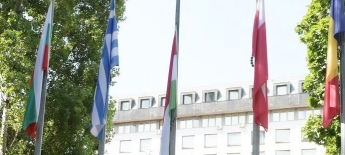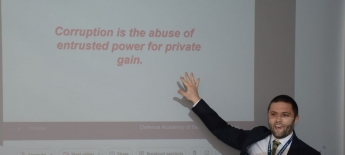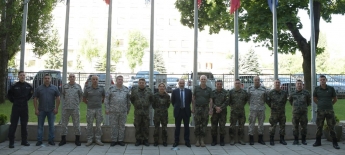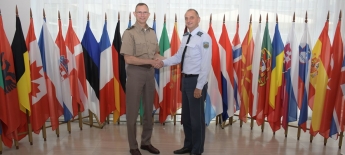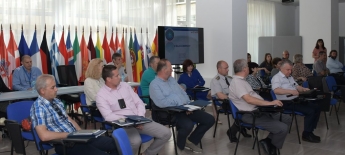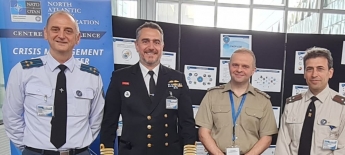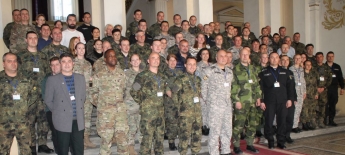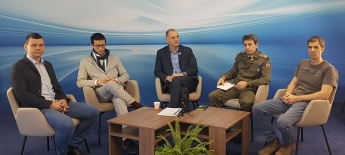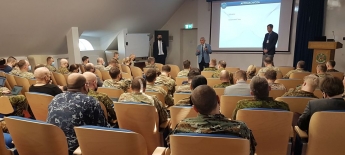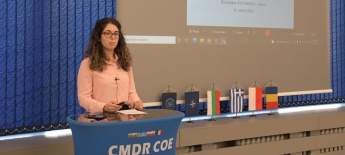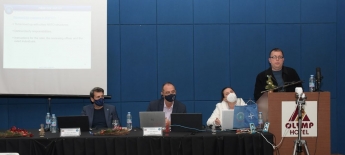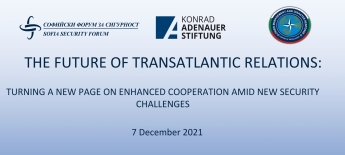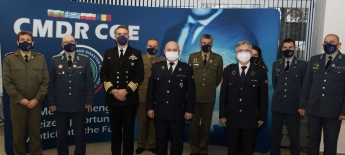Looking Back on the Very Beginning
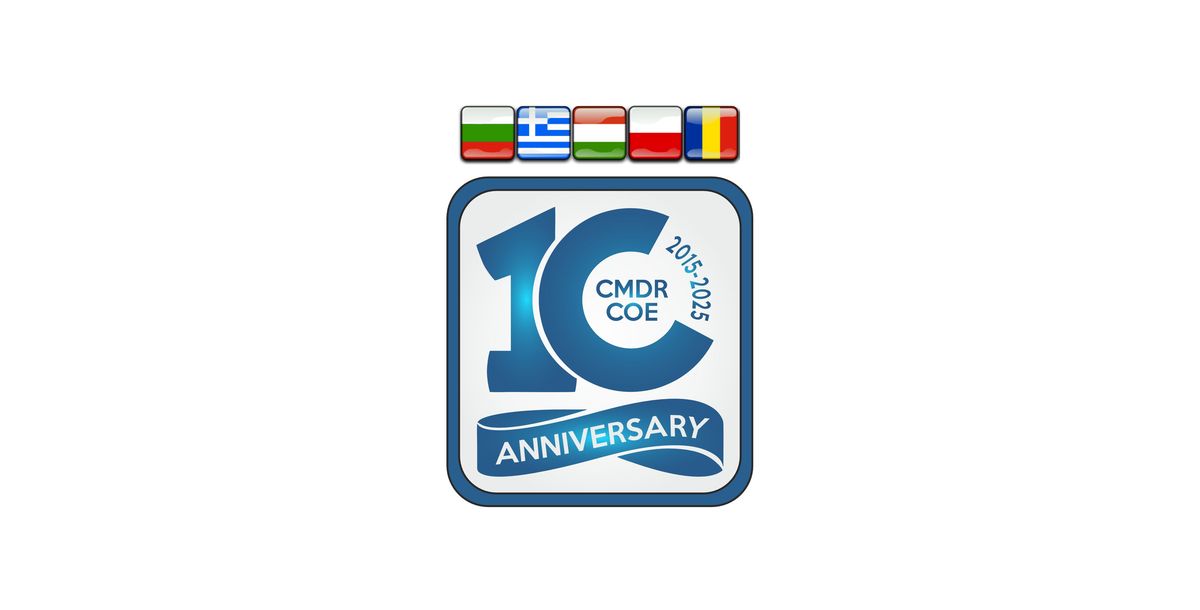
Date: (31-03-2025)
NATO's Centres of Excellence are international military organisations that are designed to provide education and training, assistance in doctrine development, lessons learned, and to support NATO to improve interoperability and defence capabilities, to test and validate concepts through experimentation. The process of development the Alliance centres significantly accelerated with Smart Defence initiative, declared at the NATO summit in Chicago, May 2012. The main objective of this approach was development of specialised expert entities in NATO that support the Alliance transformation with avoiding duplication of nations’ existing efforts, means, resources and capabilities.
NATO’s Centres of Excellence are international military organisations that are designed to provide education and training, assistance in doctrine development, lessons learned, and to support NATO to improve interoperability and defence capabilities, to test and validate concepts through experimentation. The process of development the Alliance centres significantly accelerated with Smart Defence initiative, declared at the NATO summit in Chicago, May 2012. The main objective of this approach was development of specialised expert entities in NATO that support the Alliance transformation with avoiding duplication of nations’ existing efforts, means, resources and capabilities.
In 2011, the Bulgarian Ministry of Defence initiated a project of development an expert entity, designed to assist national institutions and to provide specialised expertise for NATO nations in area of crisis management and disasters response. The project started with the establishing of a working group for development a Centre for high level of competences. The group was tasked to define an appropriate functional area and name of the Centre, to develop drafts of vision, plan and financial assessment of the project, and later on to develop a draft Concept of the Centre. The name of “Crisis Management and Disaster Relief” was contrived at that time. At the end of the 2011, the internal process of coordination was finished and the draft strategic documents for further establishing of the Centre was developed and deconflicted institutionally by Colonel Prof. Mitko Stoykov. The project was used to promote the Bulgarian MOD initiative at all possible levels of NATO, like Concept Development and Education, and Transformation Conferences, international visits and conversations. The process of deconflicting with other similar NATO entities was time consuming, prolonged up to six month.
On March 22, 2012, in accordance with the established NATO procedures for the construction of the centres, a team for the implementation of the project was established by order of the Bulgarian Minister of Defence. Taking into account the opinions of NATO Headquarters, the Joint Staff, member states and NATO centres, a second version of the Centre’s concept was developed.
The Centre was established as an independent legal entity under Article 60 of the Administration Act and a secondary budget appropriations officer under the Bulgarian Minister of Defence with Decree of the Council of Ministers No. 291/16.11.2012 (published in the State Gazette on 23.11.2012). The First Conference on the Establishment of the Centre was planned and held as results were agreed version of the Centre Concept, considered versions of the Centre’s Operational and Functional Memorandums of Understanding, proposed versions of job descriptions of the participating countries.
The Second Conference was held from March 25-27, 2013 where a support was received by the Hellenic Republic and the Republic of Poland to become the Centre’s Sponsoring countries as well as variants of the Operational and Functional Memoranda of Understanding have been agreed upon and future activities for the construction of the Centre and a time frame for their implementation until its accreditation by NATO have been identified.
NATO Partner countries also expressed increased interest in the implementation of the project (Austria, Sweden, Georgia, Ukraine, N.Macedonia, etc.). In response to questions raised by them in the NATO Military Committee, the Centre was presented at a meeting of the committee in the Euro-Atlantic Partnership Council (EACP) format on May 28, 2013. On May 27, 2013, the project was presented to the Working Group of the EU Military Committee, which requested that Bulgaria, after accreditation, provide the Centre to support the development of EU capabilities. In order to avoid duplication and competition in crisis management and disaster response capabilities between NATO and the EU, a questionnaire on the Centre’s activities in the field of training and preparation was completed and sent at the request of the EU. Contacts with NATO and EU structures continue to identify additional opportunities for cooperation and interaction.
Activities for the construction of the Centre and deadlines for their implementation:
• Continuation of talks with ministries and departments in the country for the accession of their experts to the centre – Ministry of Interior, Ministry of Transport and Communications, Ministry of Justice, Ministry of Regional Development and Public Works, Ministry of Public Works and Public Works, and others.
• National ratification of the Memorandums of Understanding for each of the Centre’s sponsoring countries (Bulgaria, Greece, Poland) – completed at the end of July 2013;
• Preparation and submission of a self-assessment of the Centre for the beginning of its accreditation – completed by the end of June 2013;
• Familiarization of the Allied Command Transformation with the self-assessment and its adoption – by mid- October 2013;
• Organization and holding of a ceremony for the official signing of the Memoranda of Understanding by the sponsoring countries of the Centre – 28.08. 2013;
• Organization and holding of the meeting of the Centre’s Management Board and visit of the NATO accreditation team – 11-12.09. 2013;
• Holding meetings and preparing interdepartmental agreements for filling expert positions by interested ministries and organizations from the country – by the end of October 2013;
• Presentation of a report by the ACT to the NATO Military Committee and a proposal to the NATO North Atlantic Council (NAC) to approve the accreditation of the Centre – by the end of October 2013.
• Decision by the NAC to grant the status of an International Military Organization – November -December 2013
After the Centre’s accreditation is completed, due to the extremely strong interest from the Partners, the preparation and conclusion of Technical Agreements with partner countries wishing to join it will begin.
Nevertheless of all effort and results, including agreement between Bulgaria and ACT, in September 2013, the new MOD leadership withdrew its support for Bulgaria’s unwillingness to build a NATO centre on its territory. A number of administrative tricks and obstacles were used to erase the hard-won achievements. In early 2014, the Ministry of Defence decided to change the status of the Centre, make it part of the Military Academy and lower the level of the expert positions. As a result, most of the appointed personnel with extremely high expertise left the Centre forever. After the change of MOD political leadership the following year, the project to build the CMDR COE was restarted.
News
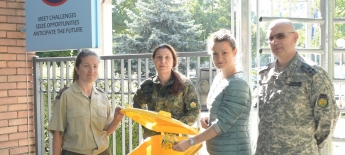 New life for used plastic – the CMDR COE launches a recycling initiative
New life for used plastic – the CMDR COE launches a recycling initiativeThe CMDR COE new approach to reducing plastic pollution.
» read more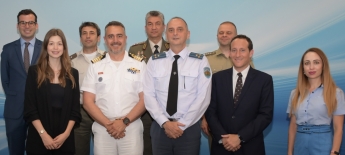 Representatives from UK and US Embassies paid a visit to CMDR COE
Representatives from UK and US Embassies paid a visit to CMDR COEThe CMDR COE is proud to announce that on 31st of May 2022 a meeting with representatives from The United Kingdom Embassy to Bulgaria and the United States Embassy to Bulgaria was held.
» read more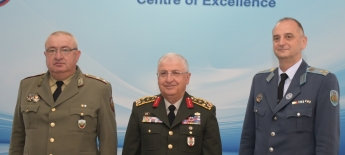 Visit of the Chief of Defence of the Republic of Turkey
Visit of the Chief of Defence of the Republic of TurkeyOn 31st of May, 2022, General Yaşar Güler, Commander of the Turkish Armed Forces paid an official visit to CMDR COE.
» read more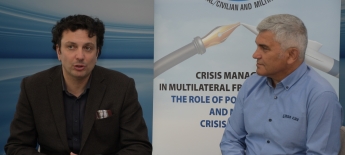 Role of Crisis Diplomacy
Role of Crisis DiplomacyTogether with Bulgarian Diplomatic Institute (BDI) online iteration of the Crisis Management in Multilateral Frameworks (IGOs): The Role of Political/Civilian and Military Crisis Diplomacy Course
» read more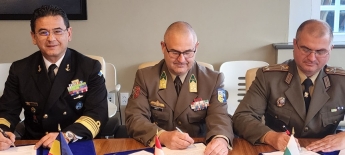 Signed Note of Joining of Hungary to CMDR COE
Signed Note of Joining of Hungary to CMDR COEWe are proud to announce that a Note of Joining of Hungary to CMDR OOE was signed at the Headquarters of the Allied Command of Transformation.
» read more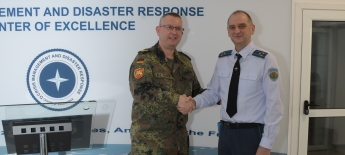 Visit of the JFCNP ACOS J9
Visit of the JFCNP ACOS J9Brigadier General Marcus Ellermann paid a visit to the CMDR COE
» read more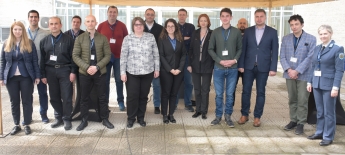 Successful hybrid iteration of the Climate Change and Security Course
Successful hybrid iteration of the Climate Change and Security CourseAnother successful iteration of the Climate Change and Security course took place from 05 to 08 April 2022 on the CMDR COE premises in Sofia, and online.
» read more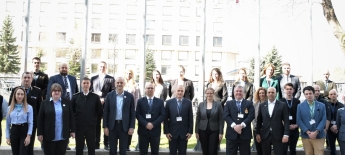 Climate Change and Security Course started
Climate Change and Security Course startedToday, 5th April, the Climate Change and Security Course began. The course is conducted under the auspicious of the European Security and Defence College (ESDC), with the support of the Diplomatic Institute to the Minister of Foreign Affairs of the Republic of Bulgaria.
» read more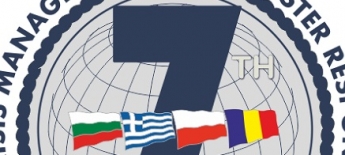 CMDR COE celebrated its 7th Anniversary
CMDR COE celebrated its 7th AnniversaryOn 31 March 2022, CMDR COE celebrated its 7th Anniversary
» read more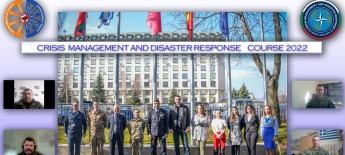 Crisis Management and Disaster Response Course successfully completed
Crisis Management and Disaster Response Course successfully completedThe hyrbid (residential and on-line) edition of the Crisis Management and Disaster Response Course was conducted in the period 21-25 Mar 2022 from the virtual studio of CMDR COE.
» read more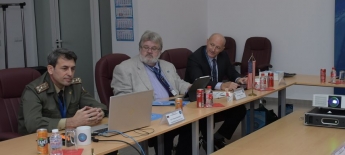 Cooperation with Department of Energy, USA
Cooperation with Department of Energy, USAProductive working meeting with representatives from the Department of Energy (US DOE)
» read more Online using JADL platform
Online using JADL platformConducting Disaster Management Course via Joint Advanced Distributed Learning (JADL)
» read more First GFP course iteration in 2022 completed
First GFP course iteration in 2022 completed Congratulations to the freshly certified GFPs!
» read more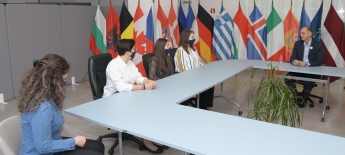 Commence the 2022 CMDR COE Internship
Commence the 2022 CMDR COE InternshipCMDR COE welcomes interns for its Spring intake of the 2022 Internship Programme
» read more
